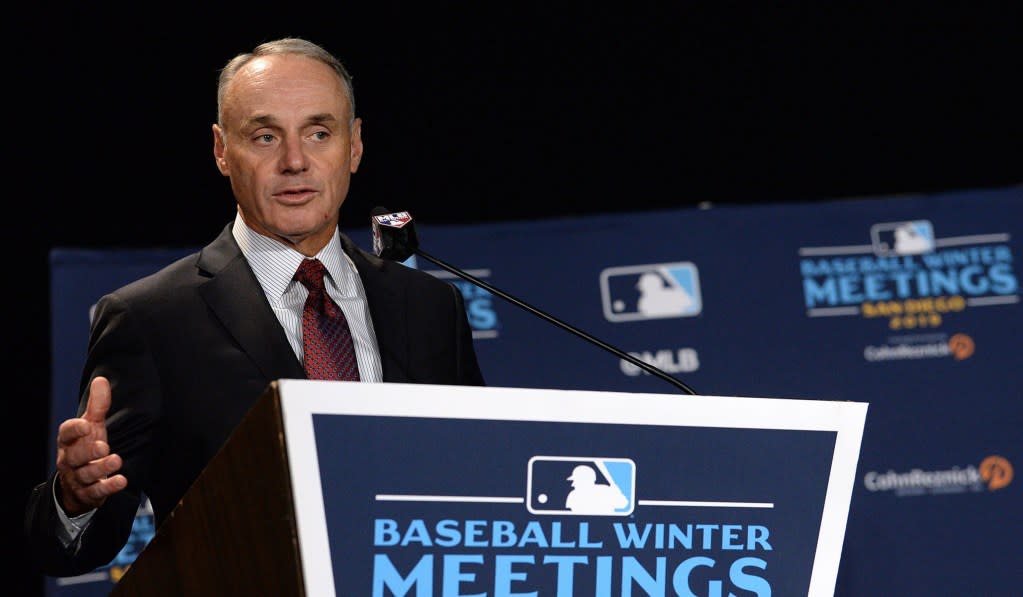Rob Manfred Is Ruining Baseball

Commissioner Rob Manfred is mulling a fundamental change to Major League Baseball, a development that should not surprise anyone, given the obstinate disregard he’s shown for the traditions and inheritance of the sport since succeeding Bud Selig in 2015. The latest novelty entertained by his office is a proposal that would expand the MLB playoffs from their current ten-team format — with three division winners and two wild-card teams in both the American and National Leagues — to a field of 14. Per ESPN, the proposal would add “a reality TV-type format to determine which teams play each other in an expanded wild-card round,” the perfectly farcical cherry on top of a perfectly farcical plan to further upend the game of baseball.
In the current postseason system — yet uncorrupted by Manfred’s caprice — each league’s two wild-card teams square off in a one-game playoff. The winner of this game in each league joins the three division champions in the Division Series. From there, the playoffs proceed like a standard two-sided bracket: The victors in the division-series games advance to their leagues’ respective championship series, and the winners of those advance to the World Series.
By contrast, ESPN describes the new proposal this way:
The team with the best record in each league would get a first-round bye, and then the other two division winners and the wild-card club with the best record could end up picking their opponents in a televised seeding showdown.
This “televised seeding showdown,” in which division winners pick their opponents, is supposed to engender “excitement” among fans. Like most ventures entertained and enacted by Manfred, it is a gimmick, designed to appeal to some amorphous and never-specified group of “potential fans” whose support is, as always, yet forthcoming.
But even setting that issue aside, the proposal exacerbates problems that inhere to professional baseball. As a sport with a significant amount of randomness — fickle bounces, blown calls, and a relatively Gaussian distribution of talent — baseball requires a 162-game regular season to separate the proverbial wheat from the chaff. The current postseason structure, with its one-game play-ins and five-game divisional series, already yields more stochastic results than the other three major North American sports leagues’ playoffs. With an expanded playoff field and a proposed three-game-series format, luck and randomness would play an even larger role in the postseason than they already do. And even this proposed change, which threatens to turn the MLB playoffs into a low-grade goat rodeo, is but a drop in the bucket compared to the other injurious “innovations” and novelties countenanced and enacted by Manfred.
He changed the rules about hard slides into second-base to break up potential double-plays, effectively removing one the sport’s precious few contact plays. He recently signed a deal with the umpire’s union that lays the foundation for the dawn of “robot umpires,” a change that would neuter the human element of the game. He pressured the Cleveland Indians to get rid of their beloved Chief Wahoo logo, and looks askance at the Atlanta Braves’s “Tomahawk Chop.” In the name of improving the pace of play, he nixed the traditional four-pitch intentional walk — which sometimes produced unforgettable moments — and replaced it with a simple hand signal from the dugout. An impending rule change will force relief pitchers to face a minimum of three batters or finish a half-inning before teams make a pitching change, removing key strategic decisions from the game.
In short, from the moment Manfred assumed the commissionership, he has time and again imposed novelty upon a fan base that did not, and does not, want it.
Aggregate ticket sales and television ratings have seen minor declines over the past few seasons, sure. But MLB’s 162-game regular season means it still sells more tickets than the other three major sports leagues, and it enjoys the devotion of local markets across the country. Manfred thinks he’s the captain of a sinking ship, free to do whatever he deems necessary to rescue the vessel from its ultimate demise. In fact, he stands on the shoulders of giants, men who built the sport of baseball into America’s pastime over the last 150 years. He ought to be more careful about changing it.

